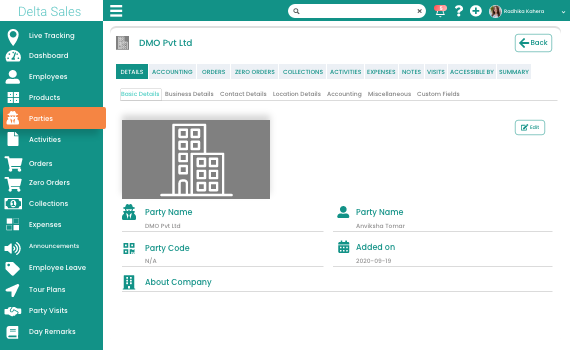What's Your Field Sales Team Missing Out Without a Sales App?

As the corporate sphere advances at an unprecedented pace today, and client requirements shift daily, overseeing a field sales force presents greater execution hurdles than before. Organizations depending solely on paper-based reporting or disconnected applications frequently encounter difficulties measuring outcomes, ensuring accurate, up-to-the-minute information, and arriving at swift, fact-based choices.
That's where a sales app comes in. It's more than a digital reporting tool, a sales app is a comprehensive solution for activity tracking, task automation, and allowing sales reps to perform at their best. If your crew hasn't joined the bandwagon yet, let's examine what they could be missing and how it could be affecting your bottom line.
1. No Real-Time Visibility into Field Activities
Lacking immediate insight, supervisors find it hard to keep tabs on their sales personnel who are frequently out visiting customers, booking sales, and gathering funds. Depending on outdated paperwork or calls frequently leads to missing data and postponed choices.
A current sales application addresses this by delivering instant knowledge about site visits, location confirmations, and client engagements. With prompt awareness of floor operations, managers can oversee results, tackle problems swiftly, and steer their groups ahead of time rather than responding once difficulties have occurred.
2. Inaccuracy in Daily Sales Records
Documenting daily sales by hand is a chore for field personnel busy with travel, client meetings, and finalizing transactions. This naturally results in mistakes, lost information, or unfinished documentation, giving supervisors imprecise accounts.
A sales application resolves this by moving all sales tasks online and synchronizing them instantly. Staff can immediately log purchases, receipts, and site visits right from their location, guaranteeing every exchange is noted precisely. With exact day-to-day sales logs, supervisors achieve full insight to review outcomes, monitor patterns, and project potential sales with assurance, leading to improved strategy, ownership, and choices based on facts.
3. Missed Insights from Performance Analytics
Lacking systematic data gathering and presentation, you're truly navigating without direction. Leaders struggle to pinpoint top-performing representatives, regions with the greatest upside, or pressing customer issues requiring focus.
A sales monitoring tool equipped with analysis features provides valuable understanding of your sales outcomes. This allows supervisors to segment information by timeframe, area, or product line to see precisely what is succeeding and what is lagging.
Without this, choices will probably stem from guesswork instead of verifiable evidence. This results in inefficient deployment of resources, missed revenue opportunities, and skewed team evaluations as time goes on.
4. Inefficient Time and Territory Management
Every minute matters in field sales. Without proper route planning or scheduling tools, your team may waste valuable hours traveling inefficiently between client locations.
A sales app helps reps plan optimized routes, reducing travel time and fuel costs. It also helps managers assign territories strategically to balance workloads. Through field force management and territory management, teams can visit more customers each day without burning out.
Without this structure, time management becomes guesswork and your sales productivity inevitably suffers.
5. Weak Customer Relationship Management (CRM)
Maintaining strong customer relationships is essential for repeat sales and long-term growth. However, without proper Customer Relationship Management , sales reps often struggle to access client histories, preferences, or order details during visits.

A sales app centralizes this information. Reps can view a customer’s previous orders, payment status, and even their communication history all from their mobile device. This enables more personalized, informed conversations that strengthen trust and improve closing rates.
Without such insights, reps are forced to rely on memory or outdated spreadsheets leading to missed cross-sell and upsell opportunities.
6. Lack of Collaboration and Communication
Effective communication between field reps and their managers is critical for success. However, when updates are shared across multiple disconnected channels emails, messages, or calls important details are easily lost.
A sales tracker eliminates this issue with built-in communication and notification systems. Managers can assign tasks, share feedback, and review updates from one dashboard. This not only saves time but also ensures complete alignment across the sales hierarchy.
Without it, even simple coordination becomes time-consuming, and valuable feedback loops are often delayed or lost.
7. Difficulty Maintaining Financial Transparency
Handling expenditures presents a significant hurdle for mobile personnel as well. Logging travel stipends, food allowances, or entertainment expenditures for clients by hand results in disorder and sluggishness.
A sales application streamlines this process with electronic expense submissions. Sales associates can record costs, attach proof of purchase, and forward them for authorization immediately. Supervisors acquire improved insight into how funds are being utilized and can authorize or deny requests right from their control panel.
The outcome? Smoother reimbursements, a lower chance of deceit, and total financial clarity are exceptionally hard to attain using traditional methods.
8. Poor Accountability and Motivation
Lacking digital performance monitoring makes it hard to gauge who is excelling and who requires more assistance. This absence of clarity can discourage even your most capable salespeople.
A sales tracking tool offers quantifiable performance data, like calls finished, deals closed, and income produced. This understanding simplifies acknowledging and compensating high achievers, as well as pinpointing opportunities for guidance.
This open, evidence-based environment encourages responsibility, rivalry, and ongoing advancement, all vital elements for a prosperous sales team.
9. Outdated Reporting and Forecasting
Businesses that rely on spreadsheets or paper-based reporting struggle to forecast demand accurately. Without reliable daily sales records, it’s impossible to anticipate customer needs or plan inventory efficiently.
A digital sales app consolidates all sales data into easy-to-read dashboards. It helps managers visualize patterns, track growth, and predict future trends with precision.
Such forecasting capabilities allow you to make smarter decisions whether it’s optimizing stock levels, adjusting territory strategies, or planning seasonal campaigns.
10. Reduced Team Productivity
When sales reps spend hours filling out reports or double-checking data, they have less time to do what matters most. Manual processes often slow down productivity and create frustration among field reps.
A sales app automates repetitive tasks like data entry, reporting, and lead management. With fewer administrative burdens, reps can dedicate more time to engaging customers and closing deals.
Increased efficiency also leads to higher morale, as employees feel empowered with tools that simplify their work and amplify their success.
11. Loss of Competitive Edge
In a time when rivals are employing tech to heighten output, running your operations without digital instruments places your firm in a weaker position. Businesses implementing sales force automation are seeing quicker expansion, greater precision, and stronger client loyalty.
A sales monitoring solution grants your enterprise the nimbleness to react promptly to shifts in the marketplace, examine sales trends instantly, and take advantage of new prospects. Lacking such a tool, your competition might surge ahead of you in both operational smoothness and how pleased your clientele are.
12. Missed Strategic Opportunities
At the executive tier, a lack of complete sales metrics constrains strategic choices. Without full sight of daily sales figures, leaders struggle to discern patterns, project expansion, or spot market shortfalls efficiently.
A sales application consolidates these observations into practical know-how. It assists management in mapping out growth, assessing offerings, and tuning promotional approaches to actual consumer needs.
Essentially, foregoing one means losing access to the data-backed understanding vital for making significant business choices.
Benefits of Using a Field Sales App for Businesses
Implementing a solid sales application can offer considerable perks for any external sales force. Here’s how organizations gain:
1. Boosted Efficiency
A mobile sales tool provides sales personnel with all the vital information and resources needed while they are out in the field. With immediate visibility into daily sales logs and client details, groups can conduct more sales visits, respond quickly, and finalize agreements sooner.
2. Enhanced Interaction
Keeping lines of communication open between field agents and supervisors is vital. An integrated sales monitor keeps all parties linked, making teamwork easier and more impactful throughout the unit.
3. Sharper Client Understanding
Having immediate visibility into client facts allows sales staff to grasp each customer’s tastes and necessities more thoroughly. This comprehension enables teams to customize their methods, leading to more relevant engagements and more durable connections.
4. Simplified Sales Cycle
A good sales platform gathers prospects, potential deals, and active accounts in a single locale, removing the disarray of using various instruments or documents. This organized structure promotes a more fluid workflow, helping teams advance smoothly from finding leads to securing the deal.
In brief, incorporating a field sales application into your activities improves output, fortifies dialogue, yields useful client knowledge, and simplifies the entire sales endeavor. By utilizing these advantages, firms can observe measurable upticks in their sales effectiveness and outcomes.
Final Thoughts
Should your company still be dependent on spreadsheets and manual updates, it's the moment to reconsider your methods. A dedicated sales application transcends being merely a utility; it fundamentally alters how you oversee your external sales force, enhances dialogue, and guarantees full insight into daily activities. Utilizing an automated sales monitoring application allows you to strengthen responsibility, measure output, and formulate wiser, evidence-based choices that support the efficient expansion of your enterprise.
To unlock your team’s full potential, consider implementing a powerful tool like Delta Sales App - the best field sales app designed to drive growth, efficiency, and long-term success. With its robust tracking, reporting, and automation capabilities, it helps your business stay ahead of the competition and achieve measurable results with confidence.









